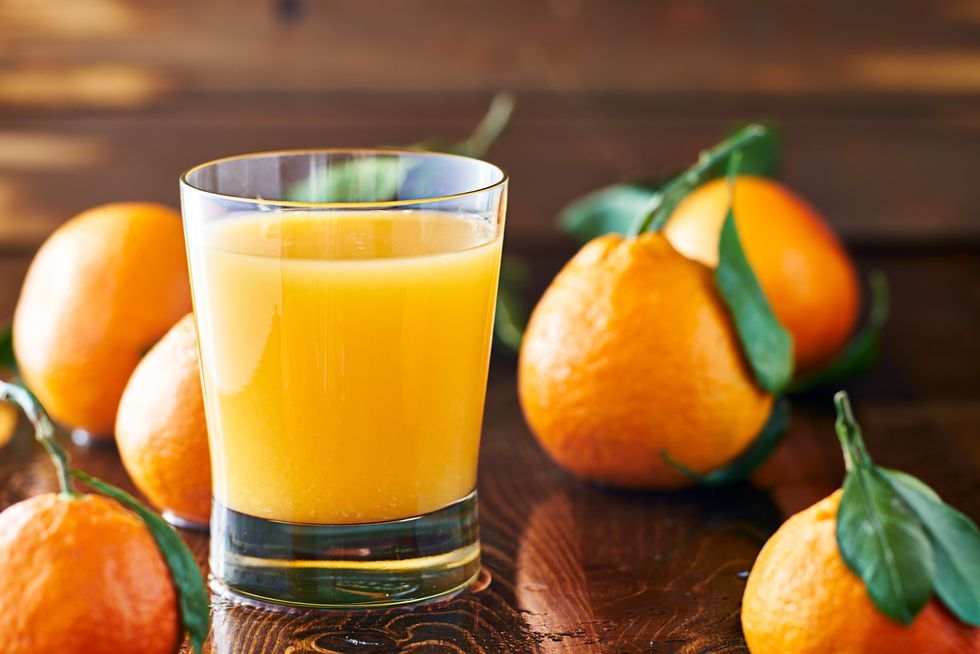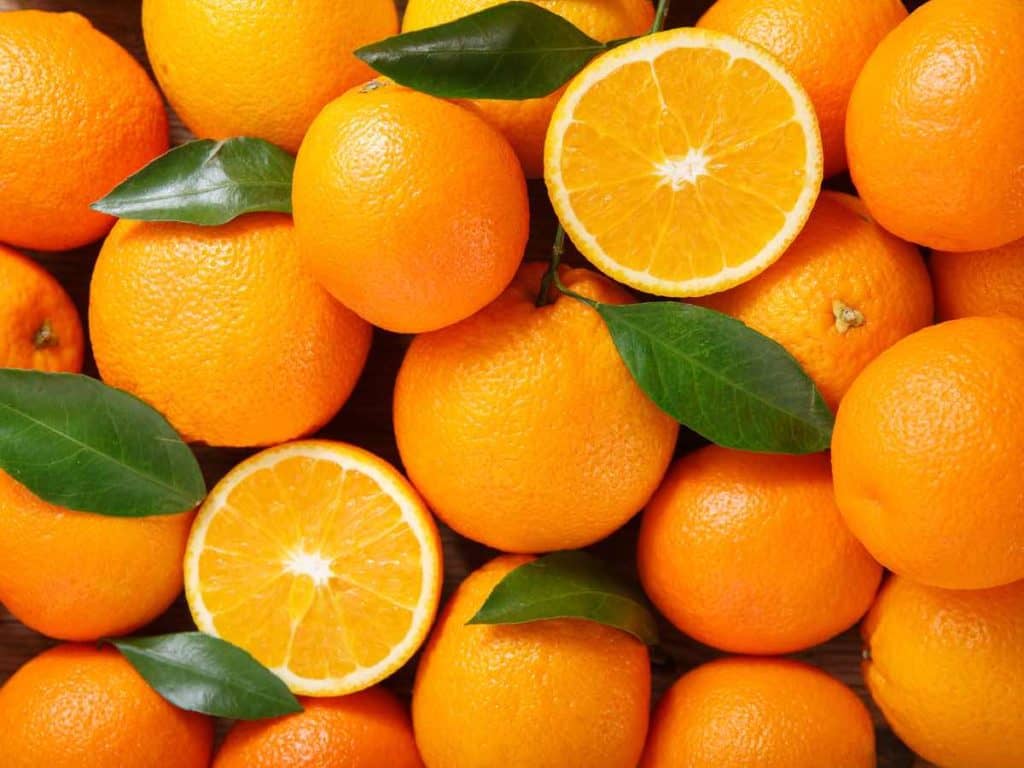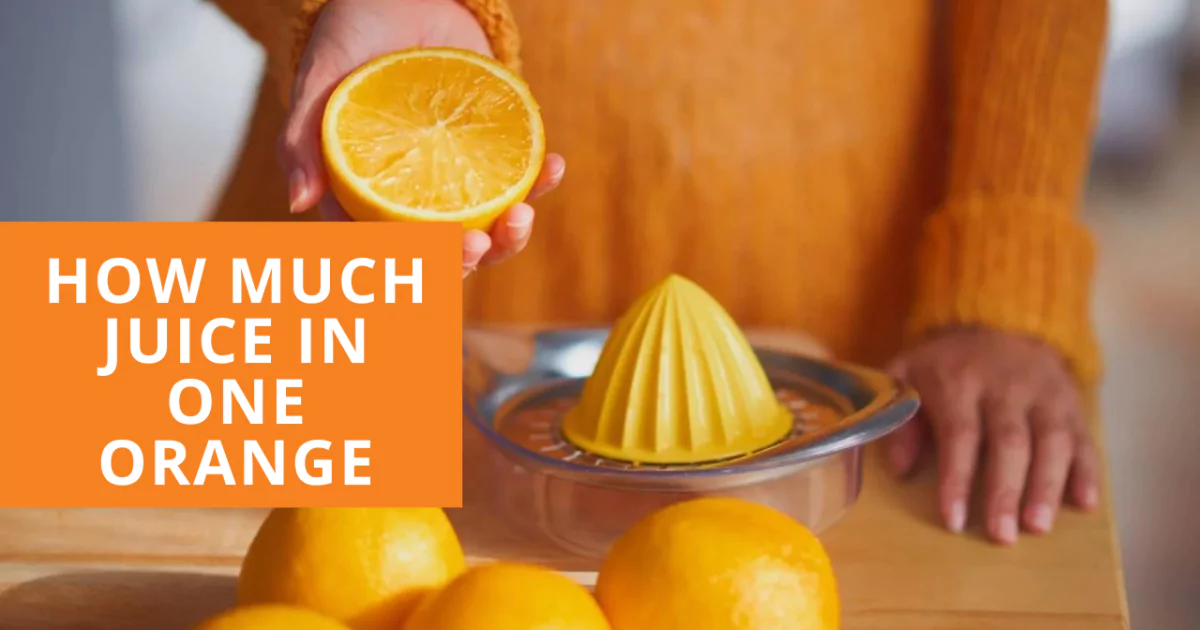How much orange juice is in one, or how many oranges for 1 cup of juice? Whether they are interested in learning about the nutritional content of oranges or figuring out how much fluid is required for a dish, many people have been captivated by this ostensibly straightforward subject.
Oranges are flavorful and energizing and a great source of essential vitamins and minerals. Understanding how much juice is in a single orange will help you better understand its nutritional advantages and culinary uses. This post will explore the specifics and comprehensively respond to fascinating subjects.
Also Read: What Vegetables Should Not Be Juiced
How Much Juice Is Actually In An Orange?
An orange juice content can change depending on the fruit’s size and variety. A medium-sized orange typically yields between 1/3 and 1/2 cup (80 and 120 milliliters) of juice.
However, it’s crucial to remember that different oranges have different levels of juiciness. While certain types, like Valencia oranges, are renowned for having a high juice content, others might not. In addition, the amount of juice in an orange might vary depending on things like ripeness and storage conditions. It is advised to roll the fruit on a firm surface before juicing or use a citrus juicer to get the most juice out of each orange.
Which Oranges Give The Most Juice?

Typically, oranges with a high juice content and a low pulp content provide the most juice. The Valencia orange is considered one of the finest juicing among the numerous orange cultivars.
Valencia oranges contain a lot of juice, a thin, peel-off skin, and a sweet flavor. The navel orange is another kind that is well-liked for juicing. Navels have a lot of juice, are seedless, and are simple to peel.
Blood oranges, particularly those of the Moro type, are renowned for their abundant juice and distinctive flavor. These oranges are famous for juicing because of their bright crimson flesh and mildly sour taste.
How To Tell If An Orange Has A Lot Of Juice?
There are a few ways to tell if an orange has a lot of juice: first, the weight of the orange can be a good indicator, as juicer oranges tend to be heavier due to their higher water content. Second, a firm and plump orange is likelier to have more juice than one that feels soft or spongy. Third, gently squeeze the orange to see if it has a lot of juice.
It is crucial to remember that these techniques are not infallible and that the only accurate way to judge an orange’s juiciness is to cut it open and visually assess the amount of juice within.
Tips For Getting The Most Juice Out Of Your Orange
Here are some simples way to get most of the juice>
- Roll the orange on a rough surface before juicing to weaken the cell walls and release more juice.
- Warming the orange in the microwave for a little period can enable you to squeeze out more juice.
- Use a citrus juicer or reamer to extract the juice from the orange after cutting it in half.
- Use a fine-mesh strainer or cheesecloth to filter out any pulp or seeds from the juice.
- To remove any residual juice, use your hands to squeeze the orange halves.
- Before juicing, keep the orange at an average temperature since chilly oranges produce less juice.
- Pick ripe and hefty oranges for their size since they are often juicier.
- Avoid over-squeezing the orange since it will result in bitter juice.
How To Make Fresh Juice At Home?
To make fresh juice at home, follow these steps:
- Select a variety of fresh produce such as oranges, apples, carrots, spinach, kale, or any other fruits and vegetables you choose.
- Thoroughly rinse the fruits and vegetables in cold water to remove dirt or debris.
- Remove any stems, seeds, or peels from the fruits and vegetables as necessary. For example, peel oranges or remove apple cores.
- Cut larger fruits and vegetables into smaller pieces that fit into your juicer or blender.
- If you have a juicer, feed the prepared produce through the machine according to the manufacturer’s instructions. The juicer will separate the juice from the pulp.
- If you don’t have a juicer, you can use a blender. Add the prepared produce and a small amount of water or juice to help blend. Blend until smooth.
- After blending in a blender, strain the mixture through a fine-mesh sieve or cheesecloth to separate the juice from the pulp.
- Pour the freshly extracted juice into a glass and serve immediately for maximum freshness and nutritional benefits.
- You can enhance the flavor of your fresh juice by adding ingredients like lemon juice, ginger, mint leaves, or honey according to your taste preferences.
- Clean your juicer or blender promptly after use to prevent any residue from drying and becoming difficult to remove.
Remember to experiment with different combinations of fruits and vegetables to create unique flavors and nutritional profiles in your homemade fresh juices!
How To Store Oranges?

Following specific guidelines for storing oranges is essential to ensure their freshness and longevity. Here are the steps to properly keep oranges:
- Select fully ripe oranges that have a firm texture. Avoid ones with soft spots, mold, or any signs of decay.
- Oranges can be stored at room temperature for up to one week. Keep them in a relaxed and well-ventilated area away from direct sunlight.
- Place oranges in the refrigerator if you want to store them for longer. This helps to slow down the ripening process and maintain their freshness. Place the oranges in a plastic bag or a perforated plastic bag to allow some airflow.
- Oranges produce ethylene gas, which can accelerate the ripening process of other fruits. To prevent this, store oranges separately from other fruits.
- Moisture can cause mold growth on oranges. Ensure that the storage area is dry and free from excess humidity.
- Regularly inspect your stored oranges for any signs of spoilage or decay. Remove any damaged or rotten oranges immediately to prevent them from affecting others.
- If you have an abundance of oranges, you can freeze them later. Peel and section the oranges, removing any seeds or pits. Place the cells in an airtight container or freezer bag, removing as much air as possible before sealing. Frozen oranges can be used in smoothies, desserts, or as a refreshing snack.
While refrigeration helps prolong the shelf life of oranges, it may affect their taste and texture slightly. Oranges are best enjoyed when consumed fresh.
How Many Oranges Are In A Glass Of Orange Juice?
The juice of 1 Orange In cup varies as compared to the glass. Orange juice can include anywhere from one to four oranges per glass, depending on the size of the oranges, the technique of juicing, and individual taste.
A glass of orange juice typically requires 3 to 4 medium-sized oranges. However, if significant, this estimate may be off her or more miniature oranges are used, or if the juice is diluted with water or other components, fewer real oranges may be utilized in producing some commercial orange juices since the liquid is concentrated. Each orange’s juiciness and maturity impact how much fluid it extracts.
What Is Vitamin C Amount In A Glass Of Freshly Squeezed Orange Juice?
Depending on the orange size and juicing technique, the quantity of vitamin C in freshly squeezed orange juice might change. A newly pressed 8-ounce (240 ml) glass of orange juice typically has 124 milligrams of vitamin C. It is crucial to remember that exposure to light, air, and heat can cause the vitamin C concentration to diminish over time. The amounts of vitamin C can also be impacted by other elements, including the oranges’ level of ripeness and the juicing procedure. To maximize the vitamin C content of orange juice, it is advised to drink it immediately after it has been squeezed.
What Is The Best Time Of Year To Grow Oranges?
The particular type and the environment in which they are cultivated determine the ideal time of year for orange cultivation. In general, warm areas with temperatures between 55°F and 85°F (13°C and 29°C) are best for orange growth. In most areas, spring is the best time to grow orange trees after the risk of frost has gone. In advance of the sweltering summer months, this enables the trees to build their root systems. Oranges may, however, be grown all year round in some warmer areas, such as sections of Florida and California. When deciding when to plant oranges, it’s necessary to consider variables like soil quality, sunshine exposure, and water availability.
What Does An Orange Look And Taste Like?
Oranges are spherical citrus fruits that are vivid orange in color. It has a substantial, rough peel that is simple to remove to expose the delicious inside. Oranges have a sweet and tart flavor as crisp and zesty. The flesh is commonly segmented and has vesicles, which are tiny sacs filled with fluid. Oranges are frequently consumed fresh or utilized in various culinary preparations such as juices, salads, desserts, and savory meals because of their high vitamin C concentration.
What Are Good Substitutes For An Orange?
Other citrus fruits, including tangerines, mandarins, grapefruits, and lemons, provide excellent alternatives to oranges. These fruits are ideal substitutes for oranges in recipes or as a snack since they have comparable flavors and nutrient profiles. Other fruits with equal sweetness and juiciness to oranges include peaches, apricots, and mangoes.
Can I Eat The Peel (Or Skin) Of An Orange, Or Should I Remove It First?
Yes, you can eat the peel or skin of an orange, but it is not commonly consumed due to its bitter taste and tough texture. However, some people enjoy eating the peel as it contains higher amounts of certain nutrients such as fiber, vitamin C, and antioxidants than the flesh of the orange. It is important to note that if you choose to eat the peel, washing the orange thoroughly to remove any dirt or pesticides is recommended. Additionally, organic oranges are safer as they are grown without synthetic pesticides.
However, consuming the peel in moderation is advisable as it may cause digestive discomfort for some individuals and could potentially contain harmful substances if not properly washed or sourced from organic sources. Ultimately, whether or not to eat the peel of an orange is a personal preference and depends on individual taste and dietary considerations.
What Happens If You Drink An Excessive Amount Of Orange Juice?
Drinking excessive orange juice can have several potential effects on the body. Firstly, orange juice is high in sugar, so consuming too much can lead to weight gain and an increased risk of developing conditions such as obesity and diabetes. Additionally, orange juice is acidic, so excessive consumption can irritate the stomach lining and lead to heartburn or acid reflux. The high levels of vitamin C in orange juice can also cause digestive issues such as diarrhea or abdominal cramps.
Furthermore, orange juice contains oxalate, which can contribute to the formation of kidney stones if consumed in excess. Lastly, orange juice is a natural diuretic, which can increase urine production and lead to dehydration if consumed excessively without adequate fluid intake. Drinking orange juice in moderation is essential as part of a balanced diet.
Frequently Asked Questions (FAQ’s)
Can I Juice The Whole Orange?
You can juice the whole orange, including the peel and pulp. However, it is essential to note that the peel may add a bitter taste to the juice.
What Are The Benefits Of Orange Peel?
The benefits of orange peel include high levels of vitamin C, antioxidants, and dietary fiber, which can help boost immunity, improve digestion, and promote overall health.
What Happens If You Consume An Inordinately Large Amount Of Orange Juice?
Consuming a massive amount of orange juice can lead to digestive issues such as diarrhea and stomach discomfort due to its high sugar and acid content. It may also contribute to weight gain and dental problems.
How Long Does Freshly Squeezed Orange Juice Last?
Freshly squeezed orange juice typically lasts 2-3 days when stored in the refrigerator. However, its shelf life can vary depending on factors such as the quality of the oranges, storage conditions, and whether or not it has been pasteurized.
Is It Acceptable To Drink Orange Juice Every Morning?
Yes, drinking orange juice daily as part of a balanced diet is generally acceptable, but moderation is vital due to its high sugar content.
How Many Calories Are In A Glass Of Orange Juice?
A glass of orange juice typically contains around 112-168 calories, depending on the serving size and whether it is freshly squeezed or commercially processed.
Conclusion
In conclusion, while the amount of juice produced by a single orange might vary, a medium-sized orange can make between 1/4 and 1/3 cups (60 to 80 milliliters) of juice on average. Size, variety, ripeness, and juicing methods are some of the variables that affect juice yield. To get the most juice and nutrients from each orange, picking ripe, fresh oranges for juicing is essential.






![Orange Watermelon Facts - [ Taste and Benifits ] Orange Watermelon](https://juicerhunter.com/wp-content/uploads/2023/11/Orange-Watermelon-150x150.webp)